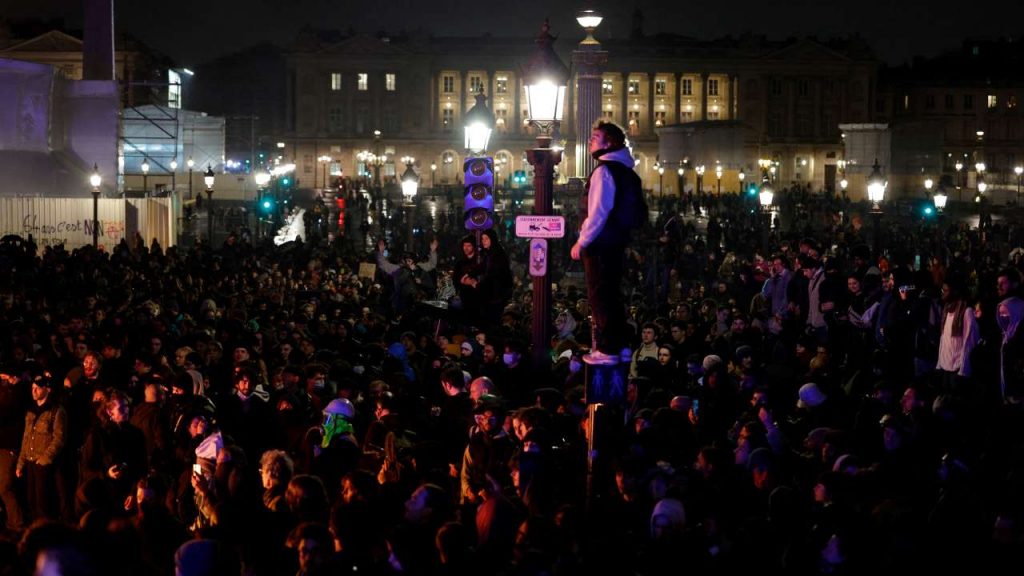The powerful social movement that developed in France in response to President Emmanuel Macron’s pension reforms has arrived at an impasse. This is due to the lack of determination of the inter-union coalition and its search for an impossible compromise with the government. In this context, Macron’s Bonapartist attack, using one of the most authoritarian levers of the Fifth Republic (article 49.3 of the constitution) has not only revived the mobilizations against his regime — it has amplified them and changed their character.
Far from the “peaceful” and “responsible” movement of which the union leaders boasted, the struggle is now developing in ways previously constrained by their control of the strikes and demonstrations. We are now entering a “pre-revolutionary moment” that could change the balance of power between the classes in France.
A Government in Crisis, Incapable of Governing
The potential of the current political and social crisis is linked, on the one hand, to the sudden governmental crisis within the framework of a deep crisis of the regime and, on the other hand, to the radicalization of the mass movement. The first determining element here is the weakness of Macron. He not only lacks popular support, but also represents a minority within the assembly.
Charles de Courson, independent centrist deputy and central architect of the cross-party vote of no confidence which Macron survived on Monday, affirmed ahead of the vote:
What is certain is that this government will not be able to govern anymore. I am not sure that the President of the Republic has considered all the consequences of his decision. The country will become more and more ungovernable. I think that the current government is in agony. We are talking about a change of Prime Minister: that seems obvious to me, but it will not solve the fundamental problem. It is going to be very bad, in the National Assembly, in the Senate and in the streets.
This situation is also developing in the context of the deepening organic crisis of French capitalism. Against the backdrop of the crisis-ridden two-party system that had previously ensured France’s political stability, the Bonapartist Macron administration had tried to win some gains for the dominant class by attacking the retirement system. Macron’s inability to do so democratically not only weakens the essential role of the presidential regime of the Fifth Republic — it opens the way to a polarization and political tension that is increasingly difficult to resolve within the institutional framework.
Growing Discontent and Militancy
The second aspect and central element of the “pre-revolutionary moment” is the radicalization of large sectors of the proletariat. For the last three days, countless riots have been taking place in different parts of the country, with numerous demonstrations and actions. Many have been spontaneous, while others were called by the local or departmental trade unions in response to workers’ radicalization.
According to an article in Le Figaro titled “How the Executive is Trying To Stop the Mechanics of Chaos,” these protests are similar to those of the Yellow Vest movement that rocked France in 2018. “‘Spreading like a virus, public spaces and some vehicles have been hit,’ said a field officer who noted in these sporadic actions ‘a lot of resemblance with the actions of the “Yellow Vests,” when the movement began to spiral out of control.’” Although the demonstrations of the last few days are, in some ways, similar to the 2018 revolts, important distinctions remain: they have not reached the same levels of violence, and, crucially, the current mobilization encompasses different layers of the proletariat.
Unlike the uprising of 2018, which was concentrated in suburban and semi-rural areas, here, the movement extends across the entire nation. Even the base of the unions is affected, including the most reformist, as shown by the action of trade unionists of the CFDT in Dijon, burning mannequins with the effigy of the government (an action condemned by the union’s general secretary Laurent Berger). As the deputy of the Marne, Charles de Courson, said: “Today, the trade unions tell us that they are not sure they can ‘hold the troops’ for long, as they used to say. We began to see the first outbursts last night. The risk is that the unions are no longer able to manage the movement.”
Still, the main difference from 2018 is that, unlike the Yellow Vests movement, today’s protests are taking root in the workplace. By taking place essentially outside of workplaces, the Yellow Vests movement did not challenge the essence of the wage relationship. In contrast, the current mobilization sees the labor movement directly involved with its traditional methods of struggle, the strike and pickets, and thus raises a whole series of demands and aspirations. From the rejection of the reform to the questioning of living and working conditions, discussions amongst protesters are pushing back against the deep logic of neoliberal capitalism and developing a potentially anticapitalist character.
While a whole series of strikes are continuing in the energy, petrochemical, port, and, to a lesser extent, railway and sanitation sectors, these elements again raise the possibility of a mass general strike dynamic. This had already been posed after March 7 but had not been able to materialize because of the restrictive approach of the inter-union. Moreover, in reaction to Macron’s deployment of article 49.3, we have seen a radicalization of the strike in the Normandy refinery, the largest in France, which led the strikers to decide to shut down the site. We are also seeing the first signs of the emergence of wildcat strikes, such as the one at the Chatillon SNCF train car maintenance center.
This generalization of the strike is partly due to the weakness of the leadership. On Friday, actions emerged at several Amazon locations in France to protest against the development of the mandatory annual contract negotiations with the bosses as well as against the pension reform. In several car factories of the PSA group, angry temporary workers have carried out sporadic work stoppages to protest bosses’ refusal to grant bonuses linked to the company’s profits despite giving them to permanent employees. This situation could become explosive, and struggles like these could increase in the coming days.
Other fronts may also open up. As Arnaud Benedetti, associate professor at the University of Paris-Sorbonne and editor-in-chief of the political and parliamentary review in Le Figaro, underlines:
The acceptability of 49.3 has taken a hit; witness the demonstrations that have formed in Paris and in many provincial cities since its announcement. It could be that this pension reform is one regressive reform too far… The challenge in this turbulent zone we have crossed into will be for the executive branch to do everything it can to prevent the university and high school youth from joining the social movement en masse. If this were to happen, we would be approaching the shores of a major crisis…”
The Main Obstacle: The Leadership of the Labor Movement
In the face of this political and social crisis, the union bureaucracies are acting as the last line of defense for the Macron regime and the Fifth Republic. Although the president’s brutality and the radicalization of the base have forced the inter-union’s leadership to call for a new day of demonstration on Thursday March 23, it is avoiding like the plague any calls that could take advantage of the political crisis to defeat Macronism.
While those on the frontlines of the struggle in the streets are beginning to call for Macron’s resignation, the inter-union continues to confine the current movement solely to the demand to withdraw the pension reform. This cowardice was made explicit by Marylise Léon, general secretary of the CFDT: “We did not want to mobilize at the beginning of the week, because we would have been stepping on the political calendar.” When asked about the motion of censure that will be discussed and voted on this Monday in the National Assembly, she replied: “We ourselves are not taking a position on this. Our agenda is not to bring down the government. Our agenda is the withdrawal of the reform.” When questioned on the different television platforms in recent days, the leaders of the CGT expressed a similar position.
This refusal to politicize the struggle is an obstacle to the development of the movement, at a time when it is possible to go on the offensive against the government and against Macron. More than ever, the slogans of “Macron resign” and “repeal of the Constitution of the Fifth Republic” are on the order of the day, along with the defense of a radical democratic program to facilitate the struggle for a government of the workers and the popular classes.
It is thus safe to say that the main obstacle for the pre-revolutionary “moment” to turn into an openly pre-revolutionary or even revolutionary situation lies in the conservative and institutional leadership of the workers’ movement.
Action Committees for the General Strike!
In order to overcome this contradiction, it is necessary to build an alternative pole of leadership of the workers’ movement that strengthens and coordinates the strikes, that gives them perspectives and the determination to achieve victory. This is a determining element for the situation to be able to make a revolutionary leap by spreading the actions to build the general strike.
Despite the surge in the radicalization of the movement, it still lacks bodies of self-organization. This absence can be explained in large part by the fact that, until now, the movement has been shaped by the calendar and the decisions of the Inter-union. If the movement acquires an autonomous and independent dynamic, the inter-union will have less and less control.
If this situation continues to intensify, the strikes, demonstrations, street confrontations, and riots will become more and more inevitable. As Révolution Permanente, Left Voice’s sister organization in France, we support all these developments, and the struggle to unify them in order to build a general strike. This is the purpose of the formation of the Réseau Pour la Grève Générale (Network for the General Strike), which is beginning to have a certain echo in the vanguard, as shown by the successful meeting at the Bourse du Travail in Paris on Monday March 13, before the situation escalated.
At the next meeting of the Network, on March 21, we will defend the fact that its militants, partly striking workers from different hot spots of the current struggle, are working to generalize the creation of action committees for the general strike, open to all militants and currents of the workers’ movement who wish to defend and build such a perspective.
With Révolution Permanente, we affirm the need to advance in the construction of a democratic representation of the sectors in struggle, coordinated at the base to equip themselves with a common politic. This is the only way to go towards a real general strike, and to offer a revolutionary alternative to the timid politics of class conciliation of the inter-union. This is the central challenge of the coming days.
First published in French on March 19 on Révolution Permanente.
Translation by Antoine Ramboz











